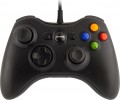Number of buttons
The total number of buttons provided in the design of the manipulator.
The more buttons — the more additional features you can "tie" to the manipulator, the lower the likelihood that during the game you will have to turn to other controls (for example, a PC keyboard). However, many game consoles (see "Platform Compatibility") provide a certain minimum number of buttons for a compatible gamepad — a smaller number simply would not allow full use of all the functions of the console. For example, the original PlayStation 4 controller has 11 buttons.
Note that the D-Pad (see below) is not included in this calculation: it is considered a specific control, although it is based on buttons.
Feedback
The type of feedback provided in the design of the manipulator (if any).
Feedback is the reaction of the manipulator to certain events occurring in the game. This reaction enhances the "immersion effect", giving the player the impression that he is holding on to a real airplane handle, car steering wheel, etc. It can be like this:
—
Vibration. Feedback in the form of vibration allows you to simulate, for example, shaking from off-road driving, aircraft trembling when firing from airborne weapons or entering a turbulence zone, etc.
— Power.
Force feedback controllers are able to create some resistance to the efforts of the player — for example, to simulate the difficulty in turning the steering wheel when the wheels are stuck in the mud.
— Vibration / power. Controllers that support both types of feedback described above. This option is the most advanced and at the same time the most expensive.
D-pad
The presence of the
D-Pad manipulator in the controller design; the type of such a manipulator can also be specified here.
D-Pad is used to move the character, cursor, etc. in strictly defined, standard directions. In some cases, this can be more convenient than using analogue levers that tilt to either side (see below). As for the varieties, nowadays there are such options:
— 4-position. The classic D-Pad, which appeared at the dawn of game consoles and does not lose popularity nowadays. Available as a set of 4 buttons in a distinctive cross-shaped layout, or as a single solid "multi-sided" button. Anyway, such a device provides 4 fixed directions: up, down, right, left. But to move diagonally, you need to select 2 corresponding directions at once; this is not always convenient, so in this regard, 4-way D-Pads are considered somewhat less practical than the 8-way ones described below. On the other hand, they are also quite functional, while being simpler in design, reliable and inexpensive; and strictly diagonal movements are not required as often as horizontal and vertical ones. So this type of D-Pads can be found even in accessories for the latest generations of game consoles.
—
8-position. A variation of the D-Pad, in which 4 standard directions (2 horizontal, 2 vertical) are supplemented by 4 intermediate — diagonal. In this case, we are usually talking about full-fledge
...d fixed positions of the manipulator; in other words, to move diagonally, you need to click not on two standard directions, but on one intermediate one. The classic design of this type of D-Pad is a multi-sided button, which is the most suitable option in this case. However, this variety also includes some solutions for 4 separate buttons — provided that these buttons are placed very close, and pressing two at once with one finger is not difficult. Anyway, 8-position manipulators are somewhat more expensive, but more convenient than 4-position ones.Sticks
The number and location of
analogue sticks provided in the design of the manipulator.
The analogue lever can be described as a "miniature joystick" — it is a protruding lever that can be deflected in any direction. Its purpose is generally similar to the D-Pad (see above), but the stick does not have fixed positions; this provides more "fine" control, which is very important in modern games. In addition, tilting it is often more convenient than pressing the D-Pad.
Separately, it is worth mentioning
sticks on Hall sensors. The design of such levers is more reliable due to the absence of rubbing and contacting parts, and the position of the stick is determined by changes in the fluctuations of the magnetic field, which are monitored by appropriate sensors. Sticks on Hall sensors do not have “dead zones”, are devoid of the drift effect (misalignment), and wear out an order of magnitude slower. However, such solutions are not cheap.
This feature is most widely used in gamepads (see "Device type") — most of these controllers have at least one lever,
models without sticks are already considered rare. In addition, such equipment, by definition, is installed in all arcade controllers; and analogue levers are also found in virtual reality weapons and motion controllers — it is very convenient to control the movement of the character through them.
...r>
As for the location, it is indicated mainly for traditional design gamepads with a full set of controls, including 2 sticks. The most common options here are the left lever on top, the right one on the bottom ( like Xbox) or both levers on the bottom (like PlayStation). Much less common are devices where both analogue sticks are installed on top — this is, in particular, a regular gamepad for Wii U, as well as many models for mobile gadgets. And in some manipulators, a customizable (adjustable) arrangement of levers is provided: usually, the right stick in such models is fixed, and the left one can be installed from above or below, changing the format of the gamepad to suit your preferences.
